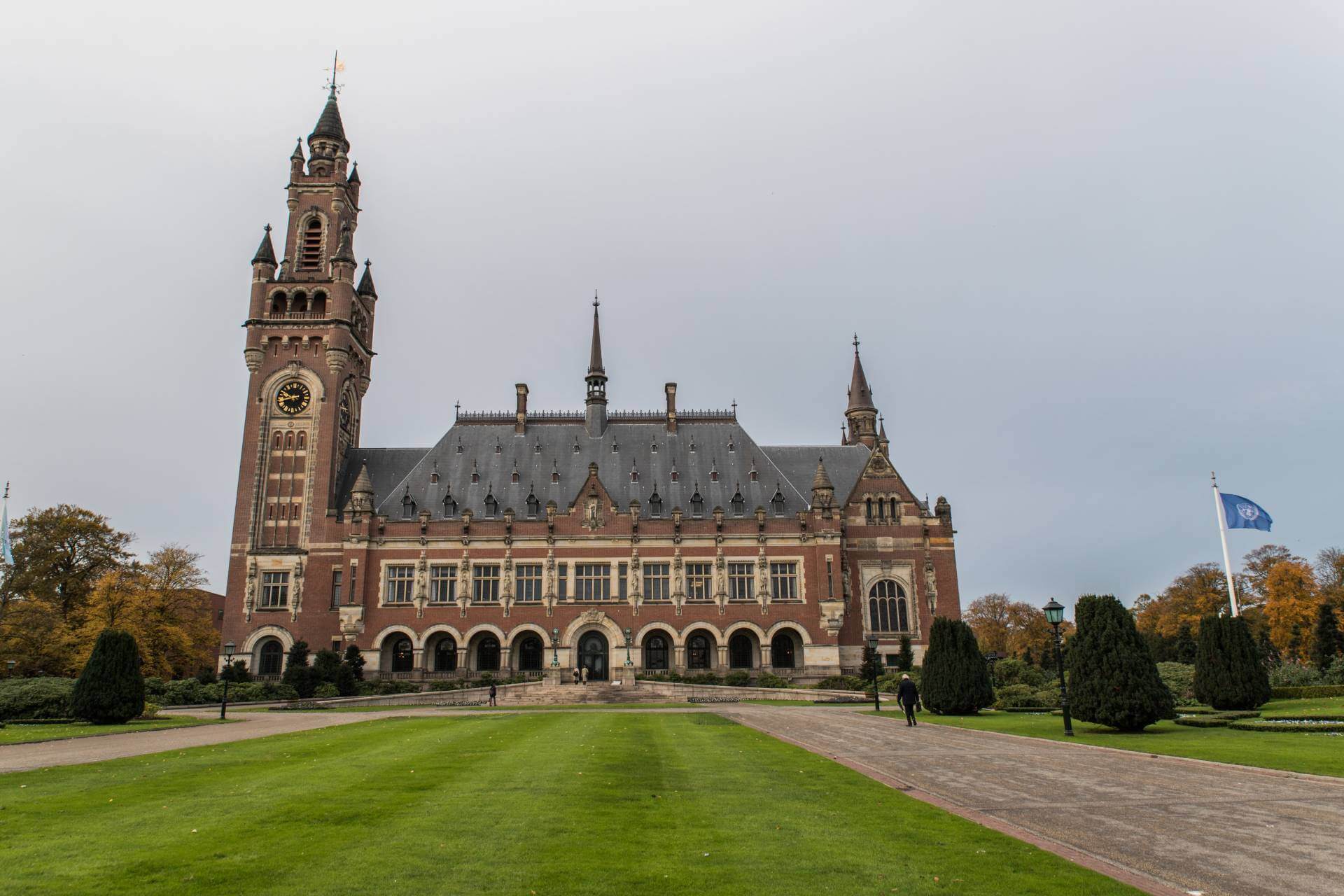Numerous experts in international law even before the ICJ’s ruling had already given solid credence to South Africa’s accusation of potential genocide. Their fear that politics might skew the court’s judgment turned out to be unfounded. Consequently, most objective observers applauded the judgment. Israel’s leaders preferred to call the court itself anti-Semitic.
Interviewed by Ryan Grim, Trita Parsi, executive vice president of the Quincy Institute for Responsible Statecraft, agreed on the ruling’s historical significance. Stepping back from the evaluation of Israel’s potential guilt, which can only be established when all the evidence is weighed and that may take years, Parsi made another observation with possibly wider implications. “Senior Biden administration officials,” he noted, “have more or less stopped using the term rules-based international order since October 7.” Law is one thing. It can always be twisted by clever lawyers. Language is another.
Today’s Weekly Devil’s Dictionary definition:
Rules-based international order:
A totemic expression commonly and uncritically used by politicians, New York Times pundits and Western media in general from the late twentieth century until the end of 2023, the moment in history when the general population finally understood that the expression referred to a mythical concept and was typically deployed for devious purposes.
Contextual note
Interviewed by former Fox News host, judge Andrew Napolitano, former British diplomat and Middle East negotiator Alistair Crooke made exactly the same point as Parsi. “For about three weeks now,” he noted, “we’ve heard nothing about the rules-based order any more… Blinken used to use it pretty well every other day.”
The term has played an interesting role in geopolitics over the past few decades. Ben Scott, writing for The Interpreter in 2021, summarized the history of the term “rules-based order” he abbreviates as RBO. Although everyone seems to agree that the purported rules were initially formulated in the aftermath of World War II, Scott explains that the popularity of the term “RBO emerged in the early 1990s under the shadow of the ‘Liberal international order (LIO)’ – a term that is still much more widely used.”
Historical trends, especially when they concern the language of propaganda, can change very abruptly. After Russia’s invasion of Ukraine in February 2022, RBO and RBIO became a dominant meme, easily eclipsing LIO. After all, sending an army across a border blatantly violates an easily perceived rule. In that sense, for Western politicians and the media Putin’s invasion constituted a linguistic godsend.
During his first year in office, US President Joe Biden insisted not so much on rules but on the kind of Manichean distinction Americans love, this time between diabolical autocracies and angelic democracies. That sounded like a convenient way of reducing the world’s geopolitical complexity. It had the advantage of echoing the propaganda of the Cold War. Philip Bump described Biden’s obsessive invocation of the distinction in a Washington Post article. Rather than accuse America’s multiple enemies of specific crimes, Biden more conveniently group them all together when he “framed the central tension of the moment as pitting democracy against autocracy.”
Thanks to Putin’s criminal invasion of Ukraine in February 2022, the language abruptly changed. Now it was no longer a case of the alleged enemies simply failing to be liberal. Putin was breaking the rules that defined the order. From that moment on, the Biden State Department has tirelessly lambasted not only its enemies for violating the RBIO. But it has also lambasted some of its friends, such as India, for resisting the rules-based requirement of applying US sanctions and embargos on Russia.
Now the language has shifted again. Trita Parsi makes a strong point. The legitimacy of a rules-based order requires that not only explicit laws, but also implicitly understood rules apply to everyone in exactly the same way. In reality it was already clear to most observers that powerful nations have the ability to twist the rules, since they alone have the power to enforce those rules.
Parsi notes that irony of the RBO today. When a nation like the US claims that an accusation of genocide is “meritless” while a duly constituted international court sees it as plausible, the suspicion of hypocrisy appears justified. “There is no consistency whatsoever,” he tells us. “There is no legitimacy or credibility talking about it given how the United States under Biden has acted in the case of Gaza.” It is therefore hardly surprising that the Biden administration’s taste for invoking any kind of rules-based order has seriously waned.
This signals a major quandary. If rules are no longer the litmus test of legitimacy, what guidelines remain to replace the vaunted RBO? The respect of sheer military might? The hallowed tradition followed by so many countries that consists of assuming Washington’s judgment is always just? Or could I be some new form of ideology, such as the one that prevailed during the Cold War when God-fearing capitalism opposed atheistic communism?
Times have changed. None of those principles defining the world order is convincing. For most nations, the problem of behavioral guidelines is further compounded by the increasingly credible prospect of a second Donald Trump term in the White House. Even the European governments – hitherto incapable of undoing their shackles or even admitting they are wearing them – now understand that in Trump’s universe not only are there no rules; there is also no need for rules. One consequence of this has become visible in the unseen tsunami of panic now unfurling within the brains of European leaders today as they try to envision a future they know they are powerless to influence.
Historical note
After Putin’s invasion of Russia, German chancellor Olaf Scholz launched a personal meme that occupied the headlines, even though it made no clear historical sense. He invoke the Zeitenwende or turning point. Perhaps he remembered and was trying to emulate the success of Francis Fukuyama three decades earlier when he dramatically proclaimed “the end of history.” In both cases, they got people talking.
Scholz initially used the term to describe a shift in Germany’s geopolitical stance, presumably signifying a break with Germany’s economic romance with resource-rich Russia. But by the end of the year, when the chancellor penned an article for Foreign Affairs, the term had taken on a more metaphysical character. He was now invoking “The Global Zeitenwende.” A subtitle followed: “How to Avoid a New Cold War in a Multipolar Era.”
In his article Sholz invoked the idea of defending and fostering “an international order based on the principles of the UN Charter.” Could he have been anticipating the showdown that would take place in the UN’s ICJ? Did he imagine that the UN Charter might be the instrument that would call to order the very US hegemony that Germany was now unconditionally aligned with thanks to his unilateral Zeitewende?
That hegemony has been dealt a serious blow. As an associate Professor at Al-Aqsa University in Gaza, Haidar Eid has every reason to offer a partisan reading of the court’s ruling. But his comment on its historical significance deserves our serious attention. “With this case, South Africa has put not only Israel, but the entirety of the global justice system on trial. This case is a major turning point for humanity, because it marks the first time in history when a Global South country bravely crossed a red line drawn by the colonial West and demanded its favourite settler colony, Israel, be held to account for the crimes it has long been committing against an Indigenous people.”
Eid is right to call this a turning point. Unlike Scholz he describes the precise historical context. Something in the perception of the relationship between the West and the Global South was already shifting, but now it has made something of a 180° turning.
One question remains. After turning in a new direction that would seem to call for a world order with a new set of rules, can we be certain that powerful forces of inertia already in place will not pivot back in the original direction? When a rules-based order appears compatible with genocide, it may be time for humanity to make sure that such a backward Zeitenwende simply cannot be allowed to happen.
*[In the age of Oscar Wilde and Mark Twain, another American wit, the journalist Ambrose Bierce produced a series of satirical definitions of commonly used terms, throwing light on their hidden meanings in real discourse. Bierce eventually collected and published them as a book, The Devil’s Dictionary, in 1911. We have shamelessly appropriated his title in the interest of continuing his wholesome pedagogical effort to enlighten generations of readers of the news. Read more of Fair Observer Devil’s Dictionary.]
The views expressed in this article are the author’s own and do not necessarily reflect Fair Observer’s editorial policy.
Support Fair Observer
We rely on your support for our independence, diversity and quality.
For more than 10 years, Fair Observer has been free, fair and independent. No billionaire owns us, no advertisers control us. We are a reader-supported nonprofit. Unlike many other publications, we keep our content free for readers regardless of where they live or whether they can afford to pay. We have no paywalls and no ads.
In the post-truth era of fake news, echo chambers and filter bubbles, we publish a plurality of perspectives from around the world. Anyone can publish with us, but everyone goes through a rigorous editorial process. So, you get fact-checked, well-reasoned content instead of noise.
We publish 2,500+ voices from 90+ countries. We also conduct education and training programs
on subjects ranging from digital media and journalism to writing and critical thinking. This
doesn’t come cheap. Servers, editors, trainers and web developers cost
money.
Please consider supporting us on a regular basis as a recurring donor or a
sustaining member.
Will you support FO’s journalism?
We rely on your support for our independence, diversity and quality.






